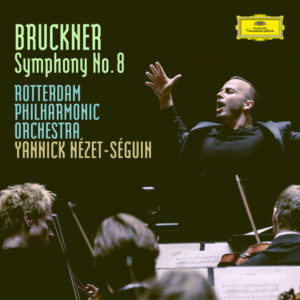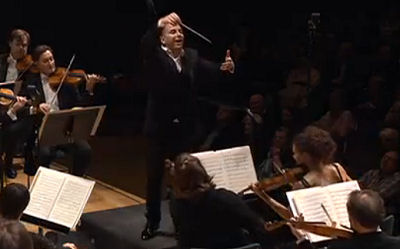Archives par mot-clé : Yannick Nézet-Séguin
Cycle Schumann – Yannick Nézet-Séguin – Chamber orchestra of Europe – Nicholas Angelich
Cycle Schumann – Yannick Nézet-Séguin – Chamber orchestra of Europe – Nicholas Angelich
|
Décidément, après Peraya il y quelques semaines, on vient encore de quitter un concert à l’entracte… On avait été alléché par le programme qui clôturait un cycle symphonique Schumann à la Cité de la musique et par la réputation croissante du chef d’origine québécoise, Yannick Nézet-Séguin, accessoirement par le soliste que l’on n’avait jamais entendu en concert, Nicholas Angelich. A entendre les applaudissements bravos, embrassades, bis après le concerto, j’ai été dû être un des seuls à partir (mais j’ai bien repéré quelques autres mélomanes qui trouvaient le temps long…). L’ouverture Genoveva tout d’abord ; on se dit qu’il faut bien que tout le monde se chauffe un peu. Le dynamisme de la fin après de longues minutes assez plates auraient dû nous mettre la puce à l’oreille. Chef assurément professionnel (il faut l’être pour avoir en même temps des responsabilités permanentes à Londres, Montréal, Philadelphie et Rotterdam), Yannick Nézet-Séguin est un chef à la battue claire et efficace. Justement l’ouverture était très claire… le faible effectif (avec un vibrato très réduit aux cordes) nous prive de « pâte » romantique. Devient-on un vieux barbon aigri, nostalgique des Furtwängler ou Kubelik ? Je ne crois pas : cf. notre récente discographie comparée du Concerto de Schumann où nous avions adoré la version « politiquement incorrecte » d’Argerich / Rabinovitch… Apparaît donc l’imposant pianiste Nicholas Angelich : le piano a l’air d’un coup se rétrécir. C’est la version la plus longuette de ce concerto que je connaisse : le chef essaie bien d’animer un peu, mais le pianiste reste impassible et prend à chaque fois un tempo un peu plus lent, avec à notre goût beaucoup d’affèteries. Seule la cadence du 1er mouvement sauve la mise. Très belle sonorité ceci dit. En bis : Rêverie. On était bien éberlué au triomphe qui suivait, encore plus en voyant faire applaudir certains solistes (vents) dont les interventions nous parurent un peu intempestives et pas toujours de la plus belle sonorité… On a écrit ce petit papier en écoutant le fin du concert sur le Net. La 2e, que le chef dirige cette fois sans partition, dont la qualité essentielle est le dynamisme, me fait penser finalement à la version Paul Paray… Si vous avez lu ce papier jusqu’au bout sachez que vous pouvez vous faire une idée par vous-même sur medici.tv ! Et puisqu’on parle de medici.tv, allez plutôt écouter l’excellent concert de l’Orchestre de Paris dirigé par Paavo Järvi et Rudolf Buchbinder… |
Definitely, after Peraya a few weeks ago, we leave again a concert after the intermission… To hear the applause, cheers, embraces, after the concerto, I was probably the only one to leave (but I located some other music lovers who also found time very long…). The Genoveva overture to begin; one thinks that it is necessary for everyone to” heat” a little. Undoubtedly Yannick Nézet-Séguin is a pro (which is necessary to be able to have at the same time permanent responsibilities in London, Montreal, Philadelphia and Rotterdam), with a clear and effective beating. Precisely the opening was very clear… the orchestra’s small size (with a very reduced vibrato for the strings) deprives to us of romantic “paste”. Does one become a nostalgic greybeard of Furtwängler or Kubelik? I don’t think: cf. our recent compared discography of the Concerto by Schumann where we had adored the “politically incorrect” version of Argerich / Rabinovitch… Then the imposing pianist Nicholas Angelich appears: the piano seems to reduce its size… It was one of the most boring lecture of this concerto I know: the conductor tries well to animate a little, but the pianist remains impassive and takes each time a tempo a little slower, with our taste many affects. Only the cadence of the 1st movement saves the lecture. Yet he has a very beautiful sound. I was well astounded by the triumph which followed, even more while seeing making applaud certain soloists (winds) whose interventions appeared a little inopportune to us and not always of most beautiful sonority… I am writing this small paper listening back home to the end of the concert on the Net. The 2nd symphony, conducted this time without score, has dynamism for essential quality ; it makes me think finally of the Paul Paray version … If you read this paper until the end, you can make your own judgment on medici.tv! And speaking about medici.tv, go and listen to an excellent concert by the Orchestre de Paris conducted by Paavo Järvi with Rudolf Buchbinder… |


